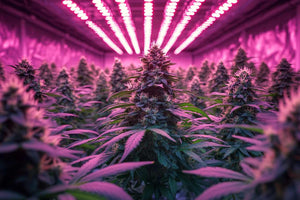When plants are relocated indoors and lose access to natural sunlight, many gardeners wonder: can these plants continue to photosynthesize effectively? The answer is yes – with the right artificial lighting solution.
While plants are highly dependent on light for growth, they don't necessarily require natural sunlight. As long as you provide a suitable light source, plants can still photosynthesize efficiently and thrive indoors.
Full spectrum LED technology has revolutionized indoor gardening by replicating the sun's complete light spectrum.

Why Traditional Lights Fall Short for Plant Growth
Not all artificial lights can meet plants' diverse growing needs throughout their lifecycle.
Limitations of Incandescent Bulbs
Ordinary incandescent lamps may brighten your room, but their spectrum is far narrower than sunlight. These bulbs emit primarily orange and red light while lacking crucial blue wavelengths. This creates an incomplete light spectrum for growing plants, since blue light is essential during early plant development, promoting healthy leaf and stem growth.
HPS Lamp Drawbacks
High-Pressure Sodium (HPS) lamps concentrate their spectrum mainly in orange-red wavelengths. While suitable for flowering and fruiting phases, they're inadequate for supporting plants through their complete growth cycle.
The spectrum of HPS lamp is mainly concentrated in the orange-red and orange parts, which is more suitable for the flowering and fruiting of plants, rather than the use of plants in the whole growth cycle.

Full Spectrum LED Grow Lights: The Complete Solution
Full spectrum LED grow lights designed for indoor plants typically emit light ranging from 400nm to 700nm – sometimes even broader. This comprehensive coverage includes all visible light frequencies: blue, red, green, and yellow wavelengths that drive efficient photosynthesis.
These full spectrum grow lights deliver balanced, abundant illumination that supports plants' absorption of various light wavelengths throughout all growth stages. Unlike single-spectrum alternatives, they provide the complete light nutrition plants need from seedling to harvest.
Customizable Spectrum Technology
Modern full spectrum led grow lights offer customizable spectrums tailored to your plants' specific needs. For instance, if your plants are flowering and require purple and far-red wavelengths, manufacturers can incorporate these spectrums to enhance flower coloration and promote blooming.

Why Full Spectrum LED Outperforms Traditional Grow Lights
Among all grow light types, full spectrum LED technology offers superior comprehensive performance compared to traditional HPS and fluorescent lamps:
1. Superior Energy Efficiency
Full spectrum LED lights consume significantly less power than HPS lights while producing equivalent light output. This efficiency translates to substantial electricity savings and reduced environmental impact.
2. Extended Lifespan
LED grow lights typically last nearly twice as long as HPS lamps, dramatically reducing replacement frequency and long-term maintenance costs. This durability makes full spectrum grow lights a smart investment for serious indoor gardeners.
3. Minimal Heat Generation
Unlike HPS lights that convert most energy into heat, full spectrum led technology operates much cooler. This reduces the risk of leaf burn and eliminates the need for additional cooling equipment, further lowering operational costs.
HPS lights' excessive heat output often requires supplementary air conditioning, while LED grow lights generate minimal heat, protecting plants while reducing auxiliary equipment consumption.
How to Choose the Right Full Spectrum LED Wattage
Selecting the appropriate wattage for your full spectrum LED grow lights depends on several factors: grow space size, plant types, and growth objectives.
Understanding PAR and PPFD Requirements
Photosynthetically Active Radiation (PAR) measures the light spectrum plants use for photosynthesis, while Photosynthetic Photon Flux Density (PPFD) indicates light intensity. Different plants require varying PPFD levels:
- Seedlings and clones: 100-300 PPFD
- Vegetative growth: 300-600 PPFD
- Flowering stage: 600-900+ PPFD
Coverage Area Considerations
Full spectrum grow lights effectiveness depends on proper coverage:
- Small grows (2x2 ft): Require focused, efficient lighting
- Medium setups (3x3 ft): Need balanced coverage and penetration
- Large operations (4x4 ft+): Demand high-output, uniform distribution
Heat Management and Energy Efficiency
Modern full spectrum LED technology generates significantly less heat than traditional alternatives, but proper ventilation remains crucial. Higher wattage units may require additional cooling in enclosed spaces, though they're still more efficient than equivalent HPS systems.
Advanced Features of Modern Full Spectrum LED Grow Lights
Dimming and Timer Controls
Premium full spectrum led grow lights often include dimming capabilities, allowing precise light intensity adjustment throughout different growth phases. Integrated timers automate photoperiods, ensuring consistent light schedules crucial for healthy plant development.
Spectrum Customization
Advanced full spectrum grow lights offer adjustable spectrum ratios. Some models allow independent control of:
- Blue spectrum (400-500nm): Promotes vegetative growth
- Red spectrum (600-700nm): Enhances flowering and fruiting
- Far-red spectrum (700-800nm): Influences plant morphology
- UV spectrum: Increases resin production in certain plants
Daisy-Chain Connectivity
Many professional-grade full spectrum LED systems feature daisy-chain connections, enabling multiple units to operate from a single power source and controller. This simplifies large-scale installations and reduces electrical complexity.
Economic Benefits of Full Spectrum LED Technology
Return on Investment Analysis
While full spectrum led grow lights require higher initial investment than traditional alternatives, their superior efficiency creates substantial long-term savings:
- Electricity costs: 40-60% reduction compared to HPS
- Replacement frequency: 2-3x longer lifespan
- Cooling costs: Minimal heat generation reduces AC requirements
- Maintenance: Solid-state technology requires virtually no maintenance
Environmental Impact
Full spectrum grow lights contribute to sustainable indoor agriculture through:
- Reduced carbon footprint from lower energy consumption
- Decreased waste from longer-lasting components
- Elimination of toxic materials found in some traditional bulbs
- More efficient food production in controlled environments
Maximizing Results with Full Spectrum LED Grow Lights
Proper Installation Guidelines
Correct installation ensures optimal performance from your full spectrum LED system:
- Height adjustment: Start higher and gradually lower as plants adapt
- Even distribution: Avoid hot spots with proper spacing
- Reflective surfaces: Maximize light utilization with reflective walls
- Temperature monitoring: Maintain optimal growing conditions
Troubleshooting Common Issues
Understanding potential challenges helps maximize full spectrum grow lights effectiveness:
- Light burn: Symptoms include leaf bleaching or curling
- Insufficient coverage: Results in stretchy, weak plant growth
- Spectrum imbalance: May cause unusual plant responses or coloration
The Future of Indoor Growing Technology
Full spectrum led grow lights continue evolving with advancing LED chip technology, improved heat dissipation, and smarter control systems. Future developments may include:
- Increased photon efficiency ratings
- Better spectrum targeting capabilities
- Integration with environmental control systems
- AI-powered optimization algorithms
Professional LED Panel Light Recommendations
For growers seeking premium full spectrum LED grow lights, quantum board technology represents the cutting-edge of indoor cultivation lighting. These advanced systems deliver superior photon efficiency, uniform light distribution, and exceptional build quality.
TheOneGrow offers professional-grade quantum board full spectrum led grow lights specifically engineered for serious indoor cultivators:
120W Quantum Board Full Spectrum LED
Perfect for small to medium grows (2x2 to 2.5x2.5 ft coverage), this compact yet powerful full spectrum grow light delivers:
- High-efficiency Samsung LM281B diodes
- Optimal spectrum for all growth phases
- Minimal heat generation
- Ideal for beginners and experienced growers alike
200W Quantum Board Full Spectrum LED
Designed for medium-sized operations (3x3 ft coverage), this mid-range full spectrum led option provides:
- Enhanced photon output for demanding plants
- Professional-grade construction
- Superior light penetration
- Perfect balance of power and efficiency
400W Quantum Board Full Spectrum LED
The flagship model for serious cultivators (4x4 ft coverage), offering maximum performance:
- Commercial-grade reliability
- Exceptional PPFD output
- Advanced thermal management
- Suitable for light-hungry plants and dense canopies
These quantum board full spectrum LED grow lights are available at TheOneGrow, where quality meets innovation in indoor growing technology.
Conclusion
For optimal indoor plant cultivation, full spectrum LED grow lights represent the pinnacle of artificial lighting technology. They provide complete spectral coverage, energy efficiency, longevity, and precise environmental control that traditional lighting simply cannot match.
Whether you're growing herbs, vegetables, or ornamental plants indoors, investing in quality full spectrum grow lights like the quantum board options from TheOneGrow will transform your indoor gardening success while reducing long-term operational costs.

